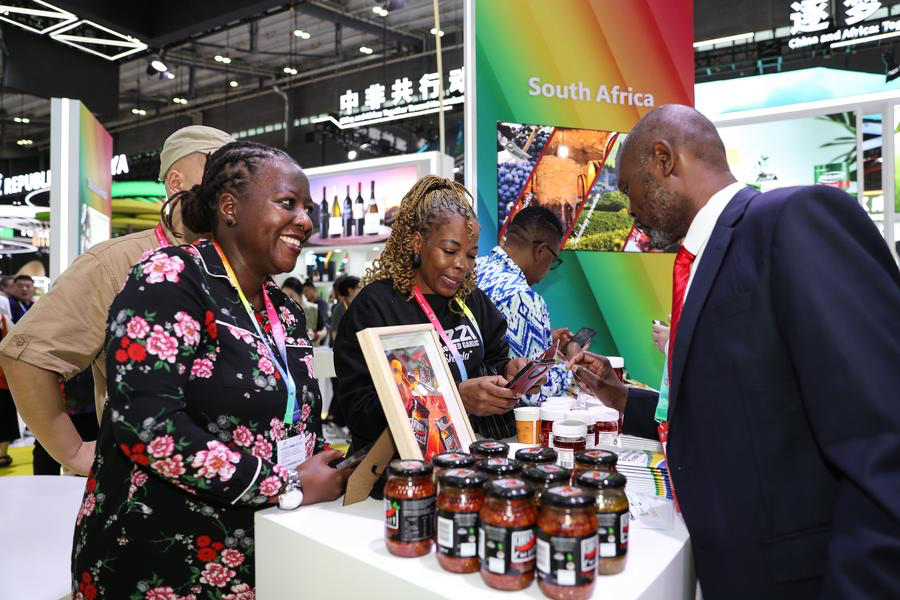By Staff writer

People visit the booth of South Africa at Changsha International Convention and Exhibition Center in Changsha, Central China’s Hunan province, June 12, 2025. [Photo/Xinhua]
As the 4th China-Africa Economic and Trade Expo (CAETE) opened its doors in Changsha, Hunan Province, a vibrant showcase of African products took center stage—offering a glimpse into a new era of economic collaboration between China and Africa. From Rwandan coffee to Ghanaian cocoa, Kenyan tea, and Ethiopian leather goods, African entrepreneurs stepped onto the global stage, propelled by China’s expanding consumer appetite and Beijing’s commitment to deepening trade ties across the continent.
This year’s Expo, themed “Common Development for a Shared Future”, brought together over 50 African countries and more than 1,500 exhibitors. It served as a critical platform for boosting two-way trade, enhancing investment cooperation, and addressing logistical and trade challenges through policy dialogues. For many African countries, the China Expo is more than just an exhibition—it is an opportunity to enter the world’s second-largest economy and diversify away from traditional export partners.
China has maintained its position as Africa’s largest trading partner for 16 consecutive years, with bilateral trade volume surpassing 2 trillion yuan for the first time in 2024 to reach 2.1 trillion yuan (about 292.7 billion dollars). While this has historically been dominated by raw materials and infrastructure deals, the Changsha Expo signals a gradual shift toward value-added goods and agricultural products from Africa.
African exhibitors showcased a broad array of offerings—natural cosmetics from South Africa, handicrafts from Morocco, cashew nuts from Tanzania, and shea butter from Burkina Faso. With China’s middle class projected to surpass 800 million by 2035, demand for unique, high-quality, and ethically sourced goods is rising. African entrepreneurs are tapping into this trend, and events like the CAETE are giving them the necessary visibility and access.
“The Chinese market is hungry for premium coffee, and we see real interest in the origin story of our beans,” said Clarisse Uwimana, a Rwandan businesswoman who participated in the Expo. “We’ve signed memorandums of understanding with two Chinese distributors already. This would have been impossible without this platform.”
Beyond exhibition booths, the Expo featured forums on logistics, digital trade, and sustainable development. One key area of focus was reducing the trade imbalance by building stronger transport and digital infrastructure. The launch of the China-Africa Trade Index by China’s Ministry of Commerce during the event aims to provide data-driven insights to guide African exporters on market trends and demand within China.
To address the perennial challenge of logistics, Chinese e-commerce giants such as Alibaba and JD.com have signed agreements with African cooperatives to simplify cross-border shipping and provide online retail channels. The move toward digital trade is particularly significant for small and medium-sized African enterprises that struggle with traditional trade barriers.
“E-commerce is a game changer,” said Dr. AminaToure, a trade policy expert from Senegal. “It eliminates middlemen and allows African farmers and artisans to sell directly to Chinese consumers. But we must also invest in training, packaging, and digital literacy.”
The Changsha Expo is part of a broader China-Africa cooperation framework under the Forum on China-Africa Cooperation (FOCAC), which emphasizes mutual development, not aid dependency. China’s Belt and Road Initiative (BRI) has also been instrumental in connecting African producers to global value chains through ports, railways, and digital infrastructure.
The China-Africa Economic and Trade Expo in Changsha is fast becoming a cornerstone of South-South cooperation. More than just a commercial gathering, it is helping reshape global perceptions of Africa from that of a passive commodity supplier to a dynamic and innovative trade partner.
As African products find shelf space in Chinese supermarkets and online platforms, the opportunity for long-term economic transformation becomes tangible. With the right policies, continued investment, and sustained collaboration, the Expo may prove to be a launchpad—not just for products—but for a new narrative of Africa’s role in the global economy.
 Africa -China Review Africa -China Cooperation and Transformation
Africa -China Review Africa -China Cooperation and Transformation
